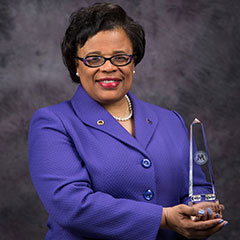May 15, 2017
Local legend: Wiley wins 2017 MANRRS Legend Award for promoting diversity in agriculture

Zelia Wiley, interim associate provost for diversity, has received the 2017 Legend Award of Minorities in Agriculture, Natural Resources and Related Sciences, or MANRRS.
The national award recognizes those who have made strong contributions to MANRRS' mission of promoting the academic and professional advancement of minorities in agriculture-related fields.
"Dr. Wiley has devoted herself to agriculture and to making sure that minority students understand the opportunities available in the agricultural sphere," said Tiffany Carter, who nominated Wiley for the award. Carter, Kansas City, Missouri, is a doctoral student in agronomy and a member of the K-State MANRRS chapter, which Wiley founded and advises.
"There is no limit to what Dr. Wiley is willing to do for her students, so I am very fortunate to have her in my corner," Carter said. "She truly is a legend in the field of agriculture and within the MANRRS organization."
Each year's MANRRS Legend winner must be an active participant in the nonprofit organization who has been a member for at least 10 years and who has participated in at least one MANRRS committee. Wiley joined MANRRS as an undergraduate student and continued participating as a graduate student and agriculture professional, eventually serving as the president of the national organization in 2007.
"It truly is an honor to be recognized by a society that I've been part of for 30 years," Wiley said. "This award has given me the extra motivation to continue because advising students through MANRRS is all about giving back and helping students become successful."
When Wiley founded the K-State MANRRS chapter in 2003, the chapter had less than five students. Now, it has more than 30 students. Wiley has increased the number of multicultural students in the College of Agriculture and has worked to increase the minority application pool of K-State Research and Extension.
"I'm glad that the changes we've made through MANRRS and the chapter's partnership with K-State Research and Extension have put K-State on the map as a safe place for multicultural students in agriculture," Wiley said.
Wiley has led MANRRS participants in improving local parks, educating school-age children about agriculture, donating school supplies to students in need, and feeding the community through outreach events. Also, she has helped more than 90 percent of graduating MANRRS students obtain further education in graduate school and get jobs in the government and in corporations.
Quentin Tyler, assistant dean and director for diversity at the University of Kentucky and immediate past president of MANRRS, credits Wiley for introducing him to MANRRS and encouraging him to take a chance on an internship that resulted in his first job offer.
"Dr. Wiley is a person who sees what you can become even when you may not believe it," Tyler said. "It has been a blessing to have her in my life as a mentor and a visible representation of hard work and being a servant leader."
Wiley also is the chair of the K-State President's Commission of Multicultural Affairs, the immediate past chair of the Black Faculty and Staff Alliance, and the local chapter advisor of Alpha Kappa Alpha Sorority Inc. In 2011, she received the Commerce Bank Presidential Award for enhancing diversity at K-State.
She earned a bachelor's degree in agricultural economics with a minor in engineering and a master's degree in agricultural education and human resources from Prairie View A&M University. She earned her doctorate in agricultural and extension education from Pennsylvania State University. Before joining K-State, she also chartered a MANRRS chapter at the University of Kentucky, where she helped increase the minority population within the agricultural college by more than 300 percent.
"I'm glad to be part of an organization that is putting a face to agriculture that is not just cows and plows but also includes components of business, science, technology, engineering and math," Wiley said. "We're exposing multicultural students to the fact that agriculture has a variety of life-long career opportunities that are open to them."
